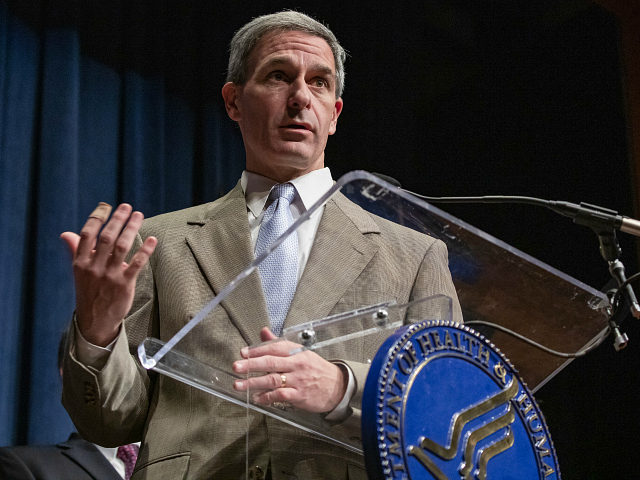The universities’ media-magnified hostility to a minor rule change for student visas is motivated by money, says Ken Cuccinelli, the acting deputy secretary of homeland defense.
“What’s really driving them is the moolah – that’s their big interest,” Cucinelli told Sirius XM’s Breitbart News Daily host Alex Marlow.
“Don’t forget the one big thing — the old ‘Follow the Money,” he said July 9. “They’re making big, big money.”
Breitbart News has described how universities — and the Fortune 500 companies — profit as ambitious middle-class foreigners annually pay $40 billion in tuition fees to get work permits and a long, low-wage road to eventual citizenship.
The resulting inflation of the white-collar labor supply keeps roughly 1.3 million foreign contract-workers in U.S. jobs. It cuts salaries for American graduates, denies them starter jobs in Silicon Valley and in Fortune 500 firms, and slows technological innovation. It also shifts wealth from the heartland to the coasts, and from wage earners to investors.
On June 22, President Donald Trump announced he would temporarily block some of the legal pipelines which deliver foreign contract-workers straight into Fortune 500 jobs. Trump also directed his agencies to rewrite regulations for several additional pipelines, including the H-1B pipeline.
The reforms are intended to force Fortune 500 companies to hire Americans at good salaries instead of continuing to hire low-wage migrants with promises of green cards.
Trump’s reform policies were announced after U.S. graduates formed grassroots advocacy and reform groups to protect their careers, and as likely 2020 voters demand jobs with decent wages.
Polls show the public likes immigrants, but strongly favors policies that pressure companies to hire Americans.
Two huge but little-known programs generate most of the “moolah” cited by Cuccinelli.
The Optional Practical Training (OPT) and Curricular Practical Training (CPT) programs annually allow 500,000 foreign graduates and students to get work permits that last one or three years.
The foreigners then get federal work permits and are hired by American and foreign managers at Silicon Valley elite firms, at Fortune 500 companies, and at networks of low-wage subcontractor firms that serve the Fortune 500 companies. An additional 25,000 foreign graduates get H-1B work permits, jobs, and a path to citizenship.
If the universities’ supply of OPT, CPT, and H-1B customers were ended, the U.S. companies would have to compete for the 800,000 Americans who graduate from the universities with hard-earned, technology-intensive degrees.
Amid rational opposition from universities and business, Trump suspended plans to overhaul the OPT program. The overhaul may yet be approved, in part, because the unpopular wealth-transfer programs were created by White House officials in prior administrations, not by Congress. On July 10, for example, Trump called for an investigation into the universities’ tax-exempt status.
DHS announced the visa rule on July 6 to get feedback and allow for planning, said Cuccinelli.
“We made that announcement on Monday. You know we’ll formally finalize it here in the next days and couple of weeks, but we needed to get information out to the schools and students so they know what to expect and how to respond and how to plan.”
The rule partially restores a pre-coronavirus rule which bars student visas — and therefore, work permits — to people who try to enroll for only online courses. The rule exists to curb widespread fraud by poor migrants in the OPT program.
“In the schools that are 100 percent online, I’m not quite sure why anybody needs to come into the country,” he said, adding, “Under the current regulation, you can be a full-time student at Harvard or anywhere else, and the maximum number of classes you can take online is one. One. We’re making a massive exception for flexibility for this semester because of COVID. So long as people aren’t entirely online [they can get visas] and — good grief, that hardly seems like anything to complain about.”
The government is being sued by universities, including Harvard, Cuccinelli noted. But, he added, “Having Harvard sue you is like having the Washington Post editorial board come out against you: You must be doing something right.”
In this shadow fight over money, the universities are going to play up stories of individual migrants students, he said.
“You know they’re going to talk in the press about their individual concerns, telling a story about one person or another. But what’s really driving the there is the moolah – that’s their big interest,” he said.
Follow Neil Munro on Twitter @NeilMunroDC, or email the author at NMunro@Breitbart.com.

COMMENTS
Please let us know if you're having issues with commenting.